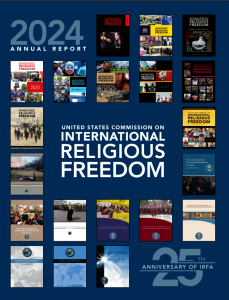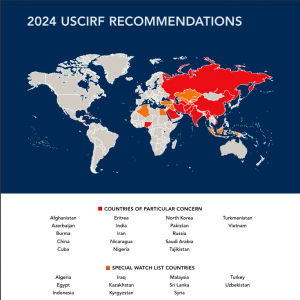Some nations notorious for oppressing religious freedom at home also waged campaigns of repression against ethnic and religious minorities living abroad in 2023, the U.S. Commission on International and Religious Freedom warned in its latest annual report.
“These governments used intimidation, harassment and violence to target political and human rights activists, journalists and members of religious and ethnic minority groups living outside their borders,” the report says. “In extreme cases, tactics included detention, reprisals against family members, kidnapping and assassinations.”
 China was the leading offender with the most extensive international operations targeting faith and ethnic groups it considers hostile, USCIRF said in the report released May 1.
China was the leading offender with the most extensive international operations targeting faith and ethnic groups it considers hostile, USCIRF said in the report released May 1.
“In 2023, the Chinese government continued its transnational repression campaigns, targeting diaspora ethnic and religious communities with ties to China, including Uyghurs, Tibetans, Protestant Christians, and Falun Gong practitioners in countries such as the United States, Japan, South Korea and Thailand.”
The study is a deep dive into the state of global religious freedom and offers numerous recommendations to the U.S. State Department and Congress on ways the U.S. could address threats and violations to faith freedoms.
USCIRF’s top recommendations include naming 17 nations as Countries of Particular Concern, a designation reserved for the most serious violators of the International Religious Freedom Act, also known as IRFA.
The list includes a dozen countries that received the designation in December: Burma, China, Cuba, Eritrea, Iran, Nicaragua, North Korea, Pakistan, Russia, Saudi Arabia, Tajikistan and Turkmenistan. USCIRF recommends Afghanistan, Azerbaijan, India, Nigeria and Vietnam be added to the list.
Another 10 nations — Egypt, Indonesia, Iraq, Kazakhstan, Kyrgyzstan, Malaysia, Sri Lanka, Syria, Turkey and Uzbekistan — are recommended for the State Department’s Special Watch List, a designation for countries that engage in or tolerate severe religious freedom violations. Algeria received the designation late last year.
USCIRF also urges State Department officials to label seven non-state actors as Entities of Particular Concern, including terror groups such as Boko Haram, the Islamic State and al-Shabaab.
 “Twenty-five years after IRFA’s passage, various state and nonstate actors continue to perpetrate or tolerate severe religious persecution,” USCIRF explains. “Governments enforce laws and policies to restrict or punish peaceful religious activity and expression, to impose official religious interpretations, or to discriminate on the basis of religion. Societal actors, including individuals, mobs and violent groups, often purporting to act in the name of religion, target those they deem the religious other.”
“Twenty-five years after IRFA’s passage, various state and nonstate actors continue to perpetrate or tolerate severe religious persecution,” USCIRF explains. “Governments enforce laws and policies to restrict or punish peaceful religious activity and expression, to impose official religious interpretations, or to discriminate on the basis of religion. Societal actors, including individuals, mobs and violent groups, often purporting to act in the name of religion, target those they deem the religious other.”
Few fit that description more than Afghanistan. In 2023, the nation lived into its reputation for religious persecution with increasingly severe penalties against religious minorities and Muslims who deviate from strict interpretations of Shari’a law.
“The Taliban expanded and enforced dozens of edicts and decrees based on their religious interpretation to restrict Afghans’ movement, dress, employment and education, disproportionately impacting religious minorities as well as women and girls,” the commission reports.
“Throughout the year, Taliban officials conducted hundreds of public floggings and detainments across the country after finding individuals guilty of offenses deemed illicit or immoral, without due process. They detained a number of journalists, women’s rights activists and religious minorities.”
In addition to naming Afghanistan a Country of Particular Concern, the U.S. should use targeted sanctions against the Taliban and prioritize Afghan refugees who face religious persecution by the regime, the commission recommends.
The report takes Burma to task for deteriorating religious freedom conditions in its ongoing war against pro-democracy forces and Baptists and other minority faith groups.
Atrocities by the military junta include ground and air attacks against communities and houses of worship, the report says. “As of the end of 2023, hundreds of thousands of people were internally displaced in Burma, including over 100,000 people in Christian-majority Kayah State. Rohingya refugees from Burma located in Bangladesh continued to face an uncertain future.”
Some bad actors were singled out in the report for going beyond their own borders to persecute religious and ethnic minorities.
“China operates over 100 overseas police stations in at least 53 countries,” including one in New York City, USCIRF reported. “In May, the Justice Department charged two individuals for furthering the Chinese government’s transnational repression against Falun Gong practitioners in the United States.”
“China operates over 100 overseas police stations in at least 53 countries.”
The Chinese government also used economic and political clout to pressure nations such as Morocco, Nepal, Pakistan, Thailand and Turkey to repatriate Christian, Tibetan Buddhist and Uyghur Muslim refugees to China to face persecution.
“The Indian government similarly engaged in increased acts of transnational repression to target religious minorities living in the diaspora,” the commission found. “In addition to allegations of involvement in an assassination and assassination attempts of Canadian and American Sikh citizens, Indian government officials facilitated harassment campaigns to silence dissidents critical of religious freedom conditions in India.”
Laws banning blasphemy were another rising threat to religious freedom in 2023 — and not just in countries like Pakistan and Nigeria, the commission explains.
“For example, the Danish government passed a new blasphemy law that bans the inappropriate treatment of texts and objects of religious significance and justified its actions in a way that reinforced harmful Muslim stereotypes.”
A Protestant pastor in Poland was sentenced to eight months of community service last year for making comments deemed critical of Catholicism, USCIRF added.
“USCIRF documented 46 countries with one or more national-level laws that impermissibly restrict an individual’s ability to convert from one religion to another or to believe in no religion at all. These laws may limit or prohibit proselytism, interfaith marriage, or an individual’s ability to change his or her religious affiliation on government documentation.”


